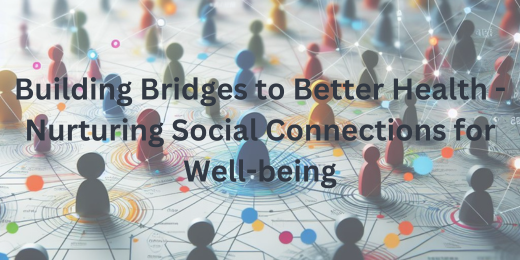Introduction: Understanding the Importance of Social Connections for Well-being
In today’s fast-paced and digitally connected world, the significance of social connections for well-being cannot be overlooked. Human beings are inherently social creatures, and meaningful interactions with others play a crucial role in our physical, mental, and emotional health. Research has shown that strong social connections contribute to reduced stress levels, improved mood, and increased overall life satisfaction. Additionally, playing outside has numerous benefits such as improved physical health, enhanced cognitive development, and a greater sense of well-being.
From friendships and family bonds to community involvement, nurturing these social connections enhances our sense of belonging and support. Moreover, during challenging times, such as the recent pandemic, the value of social connections becomes even more apparent, as they provide comfort, resilience, and a sense of unity. Embracing and prioritizing social connections for well-being is a vital aspect of leading a fulfilling and healthier life.
The Impact of Social Isolation on Health
Social isolation can have profound effects on an individual’s well-being. Human beings thrive on social connections for well-being, and when those connections are limited or absent, it can lead to adverse health outcomes. Prolonged periods of social isolation may result in increased feelings of loneliness, anxiety, and depression. Studies have shown that social isolation is linked to higher levels of stress hormones and impaired immune function, making individuals more vulnerable to illnesses. On the other hand, going outdoors offers several benefits, such as improved mood, increased vitamin D absorption, and enhanced overall well-being.
Furthermore, lacking social support can hinder one’s ability to cope with life’s challenges, increasing the risk of mental health issues. Recognizing the importance of social connections for well-being is crucial, and efforts should be made to foster and maintain meaningful relationships to promote overall health and happiness.
Benefits of Nurturing Social Connections
Nurturing social connections is essential for overall well-being. Building and maintaining positive relationships with family, friends, and community members can have a profound impact on mental and emotional health. Social connections provide a sense of belonging and support during challenging times, reducing feelings of isolation and loneliness.
Engaging in social activities and meaningful interactions can also boost self-esteem and promote a positive outlook on life. Additionally, strong social connections can act as a buffer against stress, leading to lower levels of anxiety and depression. Whether through face-to-face interactions or virtual means, investing time in nurturing social connections for well-being can lead to a happier, more fulfilling life.
Building Bridges: Strategies for Strengthening Social Relationships
Strengthening social connections is vital for enhancing overall well-being. Engaging in regular communication with friends, family, and colleagues fosters a sense of belonging and support. One effective strategy is to participate in group activities or community events that align with personal interests and values, allowing for meaningful connections with like-minded individuals. Additionally, active listening and empathy play crucial roles in deepening relationships, as they demonstrate genuine care and understanding.
Cultivating a positive and compassionate attitude towards others encourages reciprocity and fosters strong bonds. Utilizing technology to stay connected in today’s digital age is also advantageous. Whether through video calls or social media, maintaining regular contact with loved ones near and far contributes to a sense of connectedness and overall well-being.
Community Involvement and Support Networks
Engaging in community involvement and being part of support networks are essential for promoting social connections for well-being. Getting involved in local organizations, volunteering, or participating in community events allows individuals to meet new people, share experiences, and develop meaningful relationships. Support networks, whether formed through family, friends, or support groups, provide a strong sense of belonging and emotional support during challenging times.
These connections offer a safe space to express feelings, seek advice, and receive encouragement, thus contributing to improved mental and emotional health. Being an active member of a community and having a reliable support system not only enhances one’s sense of purpose and self-worth but also fosters a greater overall sense of happiness and well-being.
Conclusion: Embracing Social Connections for Improved Well-being
In conclusion, nurturing social connections is a fundamental aspect of promoting improved well-being. Whether through building strong community ties, participating in support networks, or engaging in meaningful relationships, social connections play a crucial role in enhancing mental, emotional, and physical health. The impact of social isolation on health underscores the importance of actively seeking out opportunities to connect with others.
Building bridges through community involvement and support networks fosters a sense of belonging, reduces feelings of loneliness, and provides a source of emotional support during challenging times. Embracing social connections not only enriches our lives but also contributes to a happier and more fulfilling existence, reinforcing the notion that well-being is intrinsically linked to the quality of our social connections.



